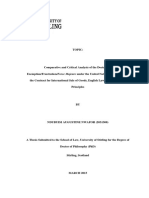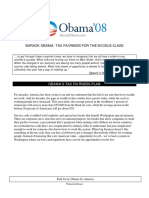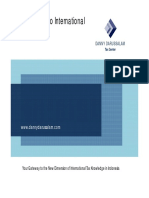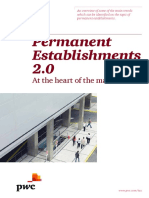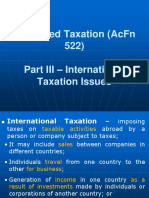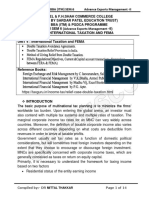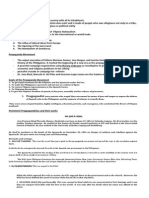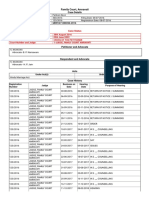Two Basic Rules of Taxation
1.
The Residence Rule.
2. The Source Rule
�The Residence Rule
Residence rule applies to the person and holds that
income of a person is taxable in the country in which he resides.
Playing in South Africa. Income is taxable in India. Residence Rule is applicable.
�The Source Rule
The source rule on the other hand applies to the
income and stipulates that an income is taxable in the country in which it originates
Playing in India. Income is taxable in India. Source Rule is applicable.
�The Problem: Double Taxation
If both the above rules are applied simultaneously in a case,
it is possible that same income gets taxed twice in 2 countries viz. in the country of residence of the person as well as in the country of source of income.
�Double Taxation
Double Taxation makes international trade unviable. Everybody would prefer to deal domestically rather then going international.
�The Remedy: Tax Treaties (DTAAs)
To avoid the above problem of double taxation,
governments of different countries enter into agreements with each other for avoidance of double taxation. These agreements are called Tax Treaties or Double Taxation Avoidance Agreement (DTAAs)
�Terminology
Source Country Residence Country/Home Country Withholding Tax
Country where income is actually earned.
Country where the person resides.
Tax recovered by Source country on the income of Non Residents.
�Tax Treaties (DTAAs)
Tax treaties basically allocate jurisdiction between the source and residence country. Different sections of agreement cover different income and provide which country shall be levying tax on that income and under what situations.
�Tax Treaty Model
Organisation of Economic Co-operation and Development (OECD) Model. United Nations Model Double Taxation Convention between Developed and Developing Countries.
United States Model Income Tax Convention
�Allocation of Taxation Rights Generally
Salary
Taxable in the country of residence unless employee is in other country beyond a prescribed period.
�Allocation of Taxation Rights Generally
Capital Gain
Taxable in the country of residence.
�Allocation of Taxation Rights
Business Income
No PE
PE
Country of Residence Source Country
�Allocation of Taxation Rights Generally
Other Income like Interest, Dividend, Royalty and
Fees for Technical Services.
Country of Residence Source Country
Generally
Limited to rates prescribed in the agreement.
�Methods of Elimination
Credit Method
In this method, credit for tax paid in the source country is given by the residence country against its domestic tax as if the foreign tax were paid to the country of residence itself.
�Methods of Elimination
Exemption Method
In this method, each country provides full exemption to the income of its residents which according to the treaty is to be taxed in another country.
�Treatment of Income covered under Treaty by a country
Residential Status Country in which Income is Taxable Treatment Taxable as per the domestic law
Residence
Resident
Source
Either full exemption is granted to income or credit for tax paid in source country is given.
�Treatment of Income covered under Treaty by a country Cont....
Residential Status Country in which Income is Taxable Treatment
Ignored
Non Resident
Residence Source
Taxable as per the domestic law subject to limitation if any by treaty
�Treaty Shopping
Is a situation where resident of a third country takes benefit of tax treaty between 2 different countries. This is normally achieved by creating layers of ownership structures between origin country and target country.
�Countries with which no agreement exists.
Country of Residence provides a unilateral tax credit.
Non Residents are taxed fully. Relief is provided to Residents.
��General Criterion for PE
As per the principal generally followed in DTAAs,
Business Income of a non resident is taxable in source country only if it is related to a permanent establishment or a fixed place of business in the source country. Accordingly business income of a non resident shall be taxable in India only if that non resident has a permanent establishment or a fixed place of business in India and income is related thereto.
�General Criterion for PE
The term permanent establishment (PE) is normally explained by Article 5 of the DTAAs. According to Article 5(2), various instances of PE include
1. 2. 3. 4. 5. 6. 7.
8.
a place of management, a branch, an office, a factory, a workshop, a sales outlet, a warehouse, a mine, an oil or gas well, a quarry or other place of extraction of natural resources
�Treaty Shopping- Prevention
Countries generally include in its tax treaties specific
rules that limit the benefits under the treaty in certain circumstances. These rules are typically called limitation on benefits or LOB provisions.
�Terminology
�Tax Heavens
Countries with very low or nil rates of taxation. Bermuda Isle of Man Cyprus Jersey Mauritius Cayman BVI
"What identifies an area as a tax haven is the existence of a composite tax structure
established deliberately to take advantage of, and exploit, a worldwide demand for opportunities to engage in tax avoidance.
..The Economist
�Tax Shelters : Offshore Companies
Creating Bulk of profits in Tax Heavens.
Example: If US Import Co. buys $1 of goods from India and sells for $3, Import Co. will pay tax on $2 of taxable income. However, tax benefits can be exploited if Import Co. is to set up an offshore subsidiary in the British Virgin Islands to buy the same goods for $1, sell the goods to Import Co. for $3 and sell it again in the domestic market for $3. This allows Import Co. to report taxable income of $0 in USA (because it was purchased for $3 and sold for $3), thus paying no tax. While the subsidiary will have to pay tax on $2, the tax is payable to the tax authority of British Virgin Islands. Since the British Virgin Islands has a corporate tax rate of 0%, no taxes are payable.


